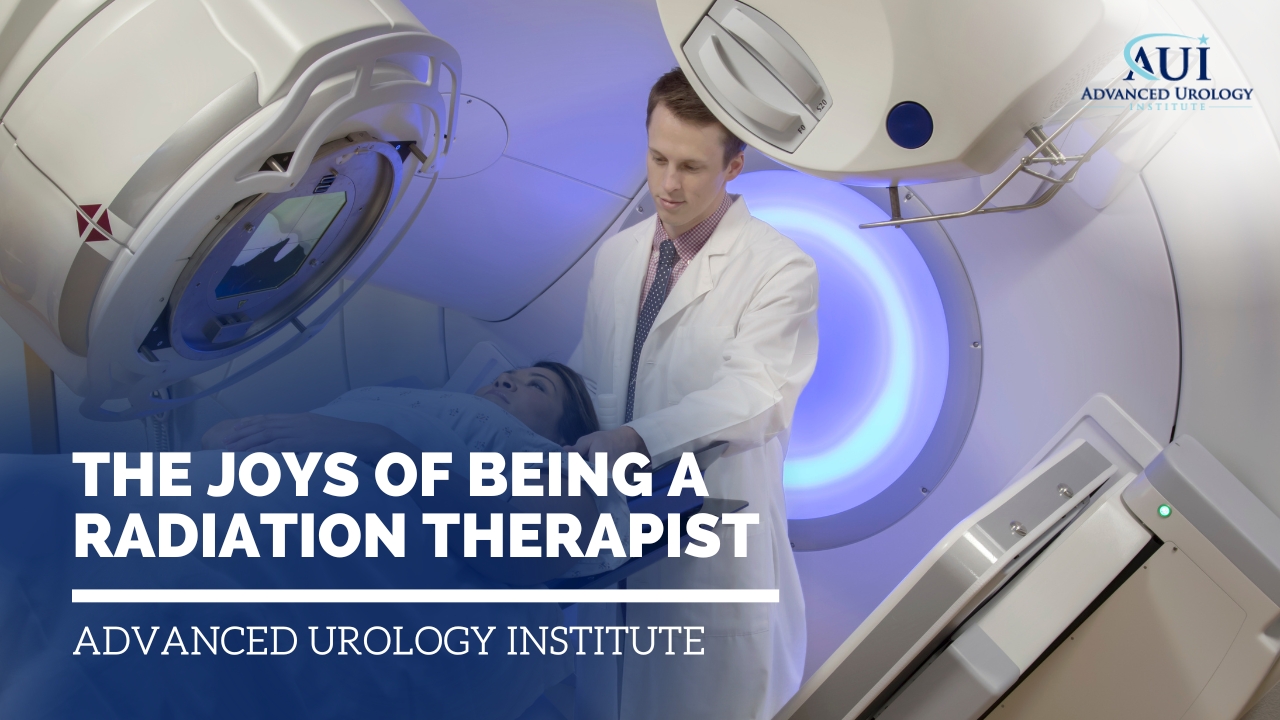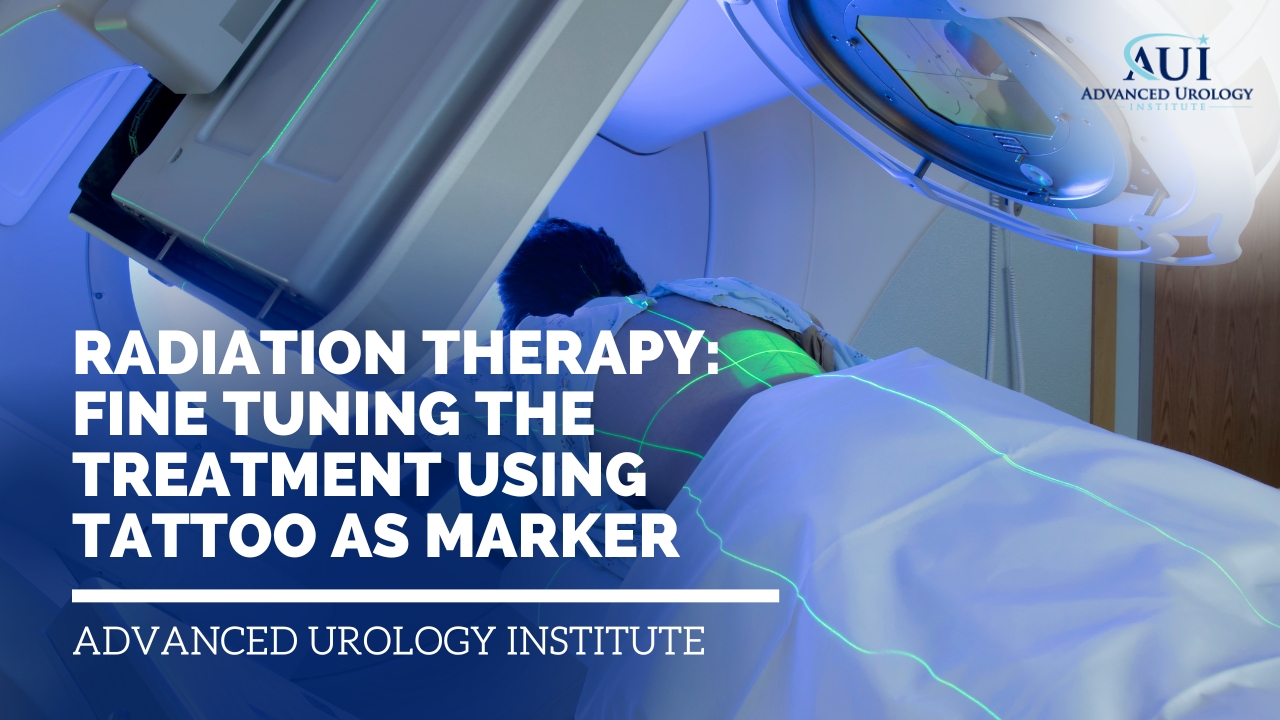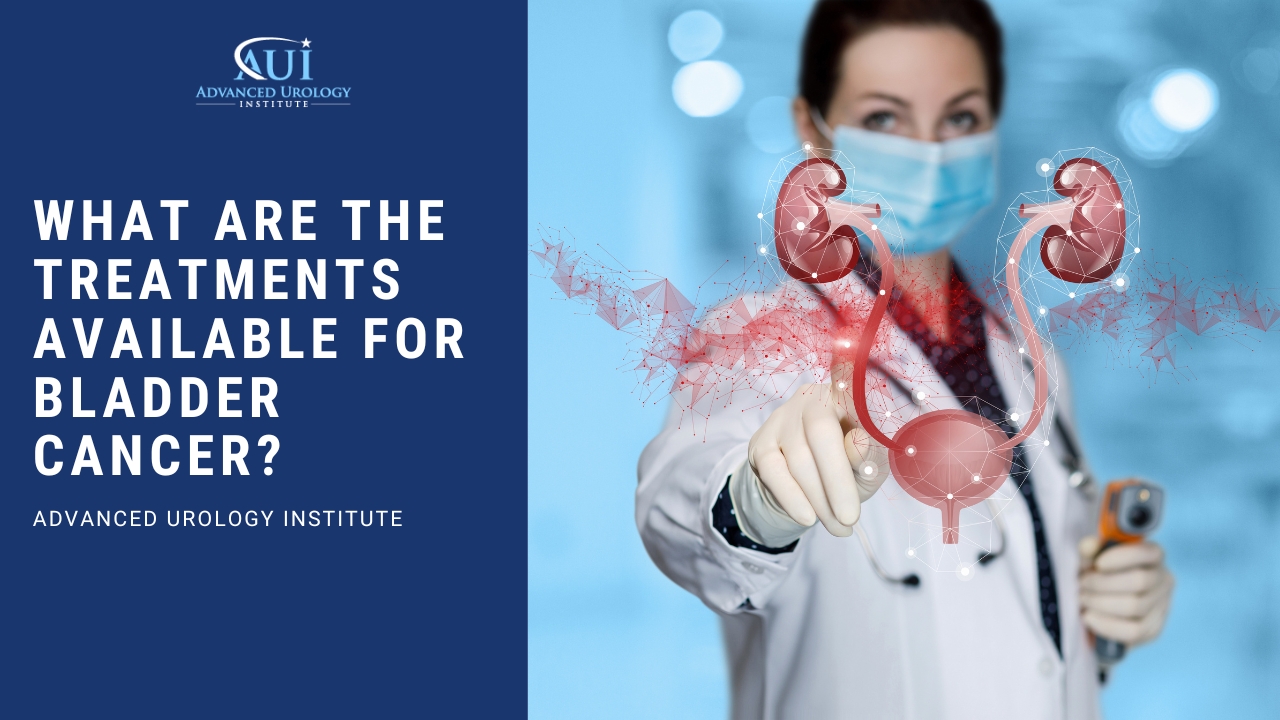At our Palm Harbor East Lake Office, you’ll find a team of highly skilled urologists and staff equipped with empathy and expertise.
Continue readingRadiation Therapy: Fine Tuning the Treatment using Tattoo as Marker
CT scanning is vital in locating the prostate, and using marks on the patient’s body ensures proper alignment during the procedure.
Continue readingWhat is National Men’s Health Month and why is it important for men’s health?
National Men’s Health Month (NMHM) is an annual observance in June to bring awareness to the overall health and well-being of men.
Continue readingWhat is the diagnosis and treatment for prostate cancer by Dr. David Harris?
The first step in diagnosing prostate cancer is obtaining a biopsy, which provides crucial information. Learn more from urologist, Dr. Harris.
Continue readingUnparalleled Urology Care Awaits You at Naples Office
Getting A CT Scan Before A Radiation Therapy
Fred, a radiation therapist at Advanced Prostate Cancer Institute, stresses the importance of a CT scan before radiation therapy.
Continue readingWhat are the treatments available for Bladder Cancer?
The types of treatment available for bladder cancer depend on the stage and type of the condition, as well as the patient’s overall health
Continue readingTrust the Experts at Windsor Oaks Office for Your Urological Needs
AUI’s Windsor Oaks Office is proud to feature a remarkable group of urologists and providers with a passion for patient care.
Continue readingThe Joys of Being a Radiation Therapist
Key Takeaways:
- Radiation therapists have the unique opportunity to develop deep, meaningful connections with the patients they treat.
- Seeing firsthand the positive impact of their work on the lives of the people they treat is a source of great joy and satisfaction.
- As a radiation therapist, you have the chance to grow both personally and professionally as you adapt to the ever-changing field of cancer treatment.
 The Blessing of Impactful Relationships
The Blessing of Impactful Relationships
As a radiation therapist, you have the unique opportunity to develop deep, meaningful connections with the patients you treat. Fred, a radiation therapist at Advanced Urology Institute in Oxford, FL, shares his experience in building these relationships with prostate cancer patients throughout his 20-year career. He says, “It’s not uncommon for me to walk into Walmart on Saturday morning doing our grocery shopping with my wife and somebody will walk up and say, hey Fred, how’s it going?”
As you work closely with patients throughout their treatment, you’ll become an unforgettable figure in their lives, and they’ll undoubtedly become unforgettable to you. While it may be hard to remember everyone’s name, Fred explains that “the face never disappears.” These lasting bonds are a testament to the life-changing work radiation therapists do every day.
The Satisfaction of Seeing Healthy Patients
By being a radiation therapist, you play a crucial role in helping patients recover from life-threatening illnesses. Seeing firsthand the positive impact of your work on the lives of the people you treat is a source of great joy and satisfaction. Patients who show their gratitude for successful treatment and care make the work worth doing. Fred reports that “it’s such a wonderful feeling to see somebody three or four years down the road that walks up, gives you a hug, shakes your hand, and says, thanks, everything is fine.”
The Importance of Continued Growth
Throughout your career as a radiation therapist, you’ll have the opportunity to learn and grow as you treat patients and adapt to the ever-changing field of cancer treatment. This constant evolution ensures that you stay at the top of your game, providing the best care possible for those who rely on you for their health and well-being.
Life at Advanced Urology Institute
As a radiation therapist at Advanced Urology Institute – the largest urology practice in Florida – you’ll have the chance to work alongside other dedicated medical professionals who share your passion for helping patients. The supportive, collaborative environment at the practice ensures that all members of the team work together to provide the highest level of care for those undergoing prostate cancer treatment.
Join the Team and Experience the Joys for Yourself
If you’re intrigued by the idea of being a radiation therapist and have a passion for helping others, consider joining the team at Advanced Urology Institute in Oxford, FL. You’ll have the opportunity to develop lasting relationships, experience the satisfaction of seeing healthy patients, and grow both personally and professionally. In the end, you’ll understand precisely what makes this work so rewarding and fulfilling.
References:
- “Radiation Therapist Career.” https://www.cambridgehealth.edu/radiation-therapist/radiation-therapist-career/.
- “5 Reasons to Become a Radiation Therapist.” https://www.cambridgehealth.edu/radiation-therapist/become-a-radiation-therapist/5-reasons-to-become-a-radiation-therapist/.
- “14 Pros and Cons of Being a Radiation Therapist.” https://www.exploremedicalcareers.com/radiation-therapist/pros-and-cons/.
Transcription:
My name is Fred. I’m a radiation therapist here at Advanced Prostate Cancer Institute. I’ve been doing this for about 20 years and it’s all been in this local area. It’s not uncommon for me to walk into Walmart on Saturday morning doing our grocery shopping with my wife and somebody will walk up and say, hey Fred, how’s it going? You turn around and you look and it’s somebody that you treated a year, two, three, four years ago, five years ago. It’s to the point now that I’ve been here long enough to where I can’t remember everyone’s name. There’s literally been thousands of people that have come across these tables that I’ve been using to treat patients with, but the face never disappears. And it’s such a wonderful feeling to see somebody three or four years down the road that walks up, gives you a hug, shakes your hand and says, thanks, everything is fine. That’s what makes this job worth doing.
What are the early warning signs of Bladder Cancer that we should be aware of?
Key Takeaways:
- Bladder cancer is a common form of cancer in the US and it’s important to be aware of the warning signs including blood in urine, painful urination, urgency and frequent need to urinate.
- If any of these symptoms are present it’s important to seek medical attention and get a diagnostic evaluation to confirm the diagnosis.
- There are several measures for prevention and reducing the risk of bladder cancer, such as quitting smoking, limiting exposure to toxins and drinking lots of fluids. Advanced Urology Institute is the largest urology practice in Florida and provides personalized and advanced care.
 Bladder cancer is a form of cancer that starts in the bladder, which is an organ responsible for storing urine in the body. According to the National Cancer Institute, bladder cancer is the sixth most common form of cancer in the United States, with an estimated 79,030 new cases this year.
Bladder cancer is a form of cancer that starts in the bladder, which is an organ responsible for storing urine in the body. According to the National Cancer Institute, bladder cancer is the sixth most common form of cancer in the United States, with an estimated 79,030 new cases this year.
There are a variety of risk factors associated with bladder cancer, including a family history of bladder cancer, gender, age, and certain habits such as smoking. Men are more likely than women to develop bladder cancer, and are especially at a higher risk if they are over the age of 40.
Early detection of bladder cancer is key for successful treatment, but it’s important to first be aware of the warning signs. The most common symptom of bladder cancer is hematuria, or blood in the urine, but there are several other warning signs to look out for including painful urination, urinary urgency, and a frequent need to urinate.
If any of the aforementioned symptoms are present, it’s important to get a diagnostic evaluation from a doctor. The doctor may conduct a physical exam and evaluate the patient’s medical history. Imaging tests such as a CT or MRI scan may also be performed. If cancer is suspected, a tissue sample or biopsy may be collected to confirm the diagnosis.
If bladder cancer is confirmed, treatment may consist of surgery, chemotherapy, or radiation therapy. Surgery is often recommended to remove any cancerous tumors in the bladder, and chemotherapy or radiation therapy may be used in addition to the surgery if necessary.
Although there is no way to guarantee prevention of bladder cancer, there are steps people can take to reduce their risk. Quitting smoking is highly recommended, as is limiting exposure to toxins, and drinking plenty of fluids.
In summary, bladder cancer is a serious health condition that can be successfully treated if detected early. Early-warning signs of bladder cancer include blood in the urine, pain during urination, urinary urgency, and frequent need to urinate. If any of these symptoms are present, a doctor should be contacted for an evaluation. Treatment options may include surgery, chemotherapy, and radiation therapy after an official diagnosis is made. There are several measures people can take to reduce their risk of bladder cancer, including quitting smoking, limiting exposure to toxins, and drinking plenty of fluids.
If you ever experience any of the symptoms listed and suspect that you may have bladder cancer, it’s important to seek help from a medical professional. Advanced Urology Institute is the largest urology practice in Florida, providing advanced and personalized care to help people lead healthier lives.
REFERENCES:
- “Bladder cancer – Symptoms and causes – Mayo Clinic.” 19 Apr. 2022, https://www.mayoclinic.org/diseases-conditions/bladder-cancer/symptoms-causes/syc-20356104.
- “Can Bladder Cancer Be Found Early?.” 30 Jan. 2019, https://www.cancer.org/cancer/bladder-cancer/detection-diagnosis-staging/detection.html.
- “Bladder Cancer: Diagnosis – Cancer.Net.” https://www.cancer.net/cancer-types/bladder-cancer/diagnosis.
What is Urinary Incontinence in Women and how can Dr. Amar Raval help?
KEY TAKEAWAYS:
- Women commonly experience stress incontinence and urge incontinence, both of which can significantly impact their quality of life.
- Dr. Amar Raval offers various treatment options, including medications, Interstim devices, Botox, needle acupuncture, urethral slings, and robotic surgery.
- The Advanced Urology Institute, led by Dr. Raval, is committed to helping women improve their quality of life and confidence by addressing urinary incontinence.
Urinary incontinence can significantly impact a woman’s quality of life, causing embarrassment, discomfort, and inconvenience. Dr. Amar J. Raval, a urologist in Tampa, FL, offers various treatment options for women suffering from urinary incontinence. The Advanced Urology Institute, the largest urology practice in Florida, provides comprehensive care for women experiencing urinary incontinence and other urological issues.
Types of Urinary Incontinence in Women
Women often experience two main types of urinary incontinence: stress incontinence and urge incontinence. Stress incontinence occurs when women leak urine during activities that put pressure on the bladder, such as laughing, coughing, or sneezing. Urge incontinence involves a sudden, intense urge to urinate, followed by involuntary leakage of urine. Both conditions can be distressing and inconvenient, but treatment options are available to help manage the symptoms and improve women’s quality of life.
Treatment Options for Urinary Incontinence
Dr. Raval offers a variety of treatment options to help women manage urinary incontinence. These options include:
- Medications: Some medications can help control the symptoms of urinary incontinence, particularly urge incontinence.
- Interstim device: This device stimulates the sacral nerves, helping to regulate bladder control and reducing the symptoms of urinary incontinence.
- Botox: Injections of Botox into the bladder can help relax the bladder muscles, decreasing urinary urgency and leakage.
- Needle acupuncture: Acupuncture needles can help stimulate specific points on the body, which may help reduce the symptoms of urinary incontinence.
- Urethral slings: These surgical devices can support the urethra and help prevent stress incontinence.
- Robotic surgery: For women experiencing bladder prolapse, robotic surgery can lift the bladder and prevent further prolapse.
Improved Quality of Life and Confidence
By addressing urinary incontinence, women can experience improved confidence and quality of life. Dr. Raval and the team at the Advanced Urology Institute are dedicated to helping women regain control over their bladder and live more comfortably and confidently.
Advanced Urology Institute
The Advanced Urology Institute is the largest urology practice in Florida, providing comprehensive care for patients experiencing urinary incontinence and other urological issues. Led by experienced professionals like Dr. Amar Raval, the institute offers personalized treatment plans designed to address each patient’s unique needs and preferences.
TRANSCRIPTION:
Women generally present with issues like stress incontinence where they laugh, cough and sneeze
and leak urine or feel the urge to go don’t make it in time and leak urine and those are
big issues for them to have to wet themselves while they’re out in public and to be able
to control that with either it’s a medication or different other devices whether it’s an
interstim device, Botox or you know even a needle acupuncture needle that can have sense
to help mitigate that. I think there’s a lot of options that are available as well as for
stress incontinence, urethral slings or if they have prolapse or bladder prolapse or there’s also
robotic surgery that you can do to kind of lift the bladder up and to prevent the prolapse. So
I think from a lifestyle standpoint it makes a big difference and women are generally happier
and more confident in themselves.
REFERENCES:
- “Types of urinary incontinence – Harvard Health.” 28 Dec. 2014, https://www.health.harvard.edu/bladder-and-bowel/types-of-urinary-incontinence.
- “Urinary incontinence – Diagnosis and treatment – Mayo Clinic.” https://www.mayoclinic.org/diseases-conditions/urinary-incontinence/diagnosis-treatment/drc-20352814.
- “Urinary incontinence treatments for women (Beyond the Basics).” 16 Mar. 2022, https://www.uptodate.com/contents/urinary-incontinence-treatments-for-women-beyond-the-basics.
Experience Premier Urology Care at Timber Ridge Office
Key Takeaways:
- Advanced Urology Institute’s Timber Ridge Office offers world-class urological care in Ocala, Florida.
- The office boasts a team of highly skilled and experienced urologists, providing comprehensive urology services.
- Timber Ridge Office is committed to delivering exceptional patient experiences in a professional, friendly environment.
 Your health is of paramount importance, and when it comes to urological care, you should expect nothing less than the best. Advanced Urology Institute’s Timber Ridge Office in Ocala, Florida, is dedicated to providing top-tier urology services to help you maintain optimal health. Located at 9401 SW State Road 200, Suite 3001, Ocala, FL 34481, the Timber Ridge Office is home to a team of distinguished medical professionals who are passionate about your well-being.
Your health is of paramount importance, and when it comes to urological care, you should expect nothing less than the best. Advanced Urology Institute’s Timber Ridge Office in Ocala, Florida, is dedicated to providing top-tier urology services to help you maintain optimal health. Located at 9401 SW State Road 200, Suite 3001, Ocala, FL 34481, the Timber Ridge Office is home to a team of distinguished medical professionals who are passionate about your well-being.
At the Timber Ridge Office, you’ll find an impressive lineup of accomplished urologists, including Dr. David Cunningham, Dr. Mark W. Dersch, Dr. Saumil Karavadia, Dr. Edward D. King, Dr. Dinesh S. Rao, and Dr. Harvey C. Taub. Each of these providers brings their unique expertise and dedication to patient care, ensuring that you receive the highest quality urological services in a comfortable and welcoming setting.
Dr. David Cunningham, MD, is a skilled urologist with a focus on minimally invasive surgical techniques, offering innovative treatment options for a variety of urological conditions. Dr. Mark W. Dersch, MD, specializes in general urology, providing comprehensive care for patients with a wide range of urological concerns. Dr. Saumil Karavadia, MD, is an experienced urologist, offering expertise in kidney stones, prostate health, and urologic oncology.
Dr. Edward D. King, MD, FACS, is a board-certified urologist and Fellow of the American College of Surgeons, providing advanced surgical care to his patients. Dr. Dinesh S. Rao, MD, is a dedicated urologist, offering expertise in robotic-assisted surgery for various urological conditions. Dr. Harvey C. Taub, MD, is an accomplished urologist, providing comprehensive care for patients with a wide range of urological issues.
At the Timber Ridge Office, you can expect a complete spectrum of urological services, including diagnostic testing, surgical procedures, and medical management for conditions such as kidney stones, urinary incontinence, prostate health, and urologic cancers. The team is committed to offering you the latest treatment options, utilizing state-of-the-art equipment and techniques.
As a patient at the Timber Ridge Office, you’ll experience a professional, yet friendly atmosphere where your needs are prioritized, and your questions are answered. The staff is dedicated to providing you with exceptional care, ensuring that you feel comfortable and informed throughout your treatment journey.
To take the first step toward better urological health, contact the Advanced Urology Institute’s Timber Ridge Office today by calling (352) 351-2801 to schedule an appointment or to speak with a member of their knowledgeable staff. Discover the difference that premier urology care can make in your life.
Side Effects with Radiation Therapy for Prostate Cancer
Key Takeaways:
- Technology advancements have made radiation therapy for prostate cancer far less daunting than it was in the past.
- Radiation therapy is non-invasive and virtually painless.
- Advanced Urology Institute in Oxford, FL offers state-of-the-art radiation therapy for prostate cancer.
Introduction: Changing Perceptions on Radiation Therapy
Radiation therapy for prostate cancer has come a long way in the past decade. Patients who have heard stories of their friends’ experiences with older treatments may be apprehensive. However, as one patient describes, “ten years ago, my buddy had this treatment, I’m real concerned that I’m going to go through the same thing.” Thankfully, they quickly learn that their treatment course will be much different, with far fewer side effects, due in large part to advances in technology.
The Treatment Experience: Simple, Pain-Free
One of the primary benefits of modern radiation therapy for prostate cancer is that the treatment is non-invasive and virtually painless. As one patient recounts, “their treatment time comes, they lay on the table, the machine rotates around them. It’s kind of like getting an x-ray. About ten minutes later, they’re done.” The hardest part, they say, is simply getting to the clinic every day. Patients undergoing radiation therapy for prostate cancer are often surprised by its simplicity and pain-free nature.
Targeted Treatment: Minimizing Side Effects
The new technology involved in radiation therapy has been developed to minimize side effects. By focusing the radiation precisely on the target area, side effects caused by radiation damage to surrounding tissues are significantly reduced. Patients treated with the latest technology are less likely to experience the same side effects as those who underwent treatment ten years ago.
Life After Treatment: A Positive Outlook
For many patients who have completed radiation therapy, the overall experience and recovery process is far more manageable than they initially imagined. After completing their first session, patients are often shocked by the ease and painlessness of the treatment, exclaiming “that’s it?” Confident in their decision to undergo radiation therapy, they can focus on their recovery and long-term health with a positive outlook.
Choosing The Right Clinic: Advanced Urology Institute
Finding the right clinic for prostate cancer treatment is essential. Advanced Urology Institute, the largest urology practice in Florida, offers state-of-the-art radiation therapy for prostate cancer. Their expert team, located in Oxford, FL, specializes in providing patients with effective, personalized treatment plans to minimize side effects while maximizing results. Choosing Advanced Urology Institute for your radiation therapy ensures that you will receive the highest standard of care and the most advanced treatment options available.
In summary, advancements in technology have made radiation therapy for prostate cancer treatment far less daunting than it might have been in the past. With cutting-edge techniques that minimize side effects and a focus on patient comfort, those undergoing radiation therapy can expect a positive, pain-free experience. For those seeking treatment in Florida, the Advanced Urology Institute is the premier choice for prostate cancer care. Their Oxford, FL location offers state-of-the-art radiation therapy backed by an expert medical team dedicated to patient success.
Transcription:
So, the patients that come in and say, 10 years ago my buddy had this treatment, I’m real concerned that I’m going to go through the same thing. They’re not going to see and experience the same side effects that a person who had treatment 10 years or later is going to have. Their treatment course is going to be a much different treatment course. Generally, the side effects using the new technology are going to be significantly less than they were with the older technology that we had. So, when patients hear that, they say, well gosh, that sounds really good. In general, radiation therapy for the most part is a painless procedure. It’s maybe some of the side effects that go along with radiation therapy depending on the target that we’re treating. For prostate cancer patients, they’re generally not going to have any side effects that are going to cause any pain. The treatment is going to be painless. The hardest thing they’re going to have to do is basically get to the clinic every day. When they get to the clinic, their treatment time comes, they lay on the table, the machine rotates around them. It’s kind of like getting an x-ray. About 10 minutes later, they’re done. The therapists come in the room and lower the patient on the table. On the first day, the patients normally say, hey, that’s it? And we say, yeah, that’s it. That’s all we have to do. So, they’re generally surprised about the non-invasive, painless treatment that radiation therapy gives.
What are the potential causes of Bladder Cancer and how can we protect our health?
Key Takeaways:
- Smoking, exposure to certain chemicals, and family history can all increase your risk for bladder cancer.
- Symptoms such as blood in urine, painful urination, and frequent urination can indicate bladder cancer.
- Treatment for bladder cancer typically involves surgery, chemotherapy, and immunotherapies.
Introduction
 Cancer is a broad topic that impacts millions of people across the United States every year. One type of cancer is bladder cancer. Bladder cancer is the sixth most common form of cancer in the United States and close to 80,000 people are diagnosed each year. In this article, we will discuss bladder cancer and explore the potential causes and offer tips for keeping your health in check.
Cancer is a broad topic that impacts millions of people across the United States every year. One type of cancer is bladder cancer. Bladder cancer is the sixth most common form of cancer in the United States and close to 80,000 people are diagnosed each year. In this article, we will discuss bladder cancer and explore the potential causes and offer tips for keeping your health in check.
Risk Factors Smoking
Smoking is the most prevalent risk factor associated with bladder cancer. Every time you smoke, the toxins and chemicals contained in a cigarette enter the body and cause genetic damage. Smoking is responsible for nearly half of all bladder cancers.
Exposure to Chemicals
Being exposed to certain chemicals can also make you more susceptible to getting bladder cancer. The use and misuse of hazardous chemicals in the workplace have been linked to higher rates of bladder cancer. A recent study identified twenty different chemicals that could put you at greater risk for bladder cancer development.
Family History
Family history is also a risk factor. If you have a family member who has been diagnosed with bladder cancer, then you may have an increased risk for the disease.
Symptoms
If you are experiencing the following symptoms, it is important to consult your doctor:
Blood in Urine
If you notice any blood in your urine, it could be a sign of bladder cancer. Red or dark colored urine is a common symptom along with any changes in the color or consistency.
Painful Urination
Pain or burning with urination can also be a sign of bladder cancer.
Frequent Urination
Having to urinate more frequently than usual can also point to bladder cancer. If you find yourself having to go to the bathroom multiple times a day or having trouble controlling your bladder, it is important to consult your doctor.
Diagnosis Physical Exam
Your doctor will begin the diagnostic process with a physical exam. The doctor will check your body for any signs of a tumor or growth in the bladder.
Urine Tests
Your doctor will also likely perform a urinalysis. This will help diagnose a bladder infection and any pre-existing conditions that may make you more susceptible to bladder cancer.
Imaging Tests
In some cases, your doctor may recommend imaging tests such as a CT scan or MRI. Depending on the results of your initial tests, your doctor may want a more detailed look at your organ and tissue structures.
Treatment Surgery
The most common treatment for bladder cancer is surgery. Depending on how advanced the cancer is, your doctor may recommend surgery to either remove the tumor/growth or remove a portion of the bladder.
Chemotherapy
Chemotherapy may also be used in treating more advanced cases of bladder cancer. This method of treatment helps the body fight off any cancerous cells.
Immunotherapy
Immunotherapies are a newer form of treatment and can be used in conjunction with traditional treatments such as surgery and chemotherapy. Immunotherapies use the body’s own defenses to target cancer by boosting the immune system.
Conclusion
Bladder cancer is the sixth most prevalent form of cancer in the United States and it can begin with little to no warning. We have discussed the potential risks associated with bladder cancer and a few ways to determine if you may have bladder cancer. The most common treatments are surgery, chemotherapy, and immunotherapies. It is important to stay educated on your health and to consult your doctor if you have any questions or concerns.
Advanced Urology Institute and their team of experienced urologists provide comprehensive urology care in South and Central Florida. They are the top-rated urology practice in the state and strive to provide compassionate and quality care coupled with the latest advancements in urological technology. So, if you believe you may have bladder cancer or have questions, Advanced Urology Institute can help.
REFERENCES:
- “Risk Factors and Cancer | CDC.” https://www.cdc.gov/cancer/risk_factors.htm.
- Tests and Procedures Used to Diagnose Cancer – NCI.” 17 Jan. 2023, https://www.cancer.gov/about-cancer/diagnosis-staging/diagnosis.
- “Bladder Cancer Signs and Symptoms.” 30 Jan. 2019, https://www.cancer.org/cancer/bladder-cancer/detection-diagnosis-staging/signs-and-symptoms.html.
- “Bladder Cancer: Types of Treatment.” https://www.cancer.net/cancer-types/bladder-cancer/types-treatment.
How to Treat Prostate Cancer – Dr. Sean Heron
KEY TAKEAWAYS:
- Watchful waiting may be appropriate for patients with slow-growing or non-aggressive prostate cancers, allowing for later treatment if the cancer progresses.
- Radiation therapy, such as IMRT and IGRT, is a less invasive treatment option with fewer complications than other approaches.
- The Advanced Urology Institute, led by Dr. Sean Heron, offers comprehensive care for patients with prostate cancer and other urological issues.
Prostate cancer is a common concern for many men, and understanding the available treatment options is crucial for making informed decisions about care. Dr. Sean P. Heron, a urologist in St. Petersburg, FL, discusses the various treatment options for prostate cancer, including watchful waiting, radiation therapy, and surgery. The Advanced Urology Institute is a leading urology practice in Florida, offering comprehensive care for patients dealing with prostate cancer and other urological issues.
Additional Pathology Studies and Watchful Waiting
Dr. Heron explains that once a patient has been diagnosed with prostate cancer, additional pathology studies can help determine the appropriate course of action. In some cases, patients may choose watchful waiting, which involves monitoring their prostate-specific antigen (PSA) levels every few months and undergoing a repeat biopsy after a year. This approach may be appropriate for patients with slow-growing or non-aggressive cancers, as it allows for the possibility of treating the cancer later if it becomes more progressive.
Radiation vs. Surgery
For patients who require treatment, the decision often comes down to choosing between radiation therapy and surgery. Dr. Heron and the team at the Advanced Urology Institute specialize in intensity-modulated radiation therapy (IMRT) and image-guided radiation therapy (IGRT), which are less invasive and typically have fewer complications than other treatment options. These specialized radiation treatments can effectively target cancerous tissue while minimizing damage to healthy tissue.
Cryosurgery and Radical Surgery
Dr. Heron has expertise in cryosurgery, a technique that uses extreme cold to destroy cancerous tissue. While he was the first doctor extensively trained in cryosurgery in Pinellas County, Dr. Heron acknowledges that this treatment can carry more morbidity than radiation therapy. Radical surgery, on the other hand, is another treatment option for patients who require a more aggressive approach. Dr. Heron and his team at the Advanced Urology Institute are well-versed in performing radical surgery when it is indicated and desired by the patient.
Advanced Urology Institute
The Advanced Urology Institute is the largest urology practice in Florida, offering state-of-the-art care for patients with prostate cancer and other urological conditions. Led by experienced professionals like Dr. Sean Heron, the institute provides personalized, comprehensive treatment plans designed to address each patient’s unique needs and preferences.
TRANSCRIPTION:
My name is Dr. Sean Heron and I’m with Advanced Urology Institute.
In terms of treatment, now we have a lot of additional pathology studies once patients
have cancer to look at it to decide, hey, do I even need to get this treated and patients
often choose just watchful waiting and will check their PSA every few months, repeat a
biopsy after a year and maybe treat them later if it is getting worse or more progressive.
A lot of times it comes down to radiation versus surgery.
I do have some expertise in cryosurgery.
I was the first doctor really trained for that in Pinellas County extensively, but it
really carries a lot more morbidity than the radiation treatment and everywhere throughout
the AUI.
We specialize in IMRT, IGRT, specialized radiation treatment that’s less invasive and doesn’t
have too much complications and I think we’re all pretty well versed in doing radical surgery
when that’s indicated and that’s what the patient wants to have.
REFERENCES:
- “Intensity-modulated radiation therapy (IMRT) – Mayo Clinic.” 9 Mar. 2023, https://www.mayoclinic.org/tests-procedures/intensity-modulated-radiation-therapy/about/pac-20385147.
- “IGRT – Image-Guided Radiation Therapy – RadiologyInfo.org.” https://www.radiologyinfo.org/en/info/igrt.
- “Cryotherapy for Prostate Cancer.” 1 Aug. 2019, https://www.cancer.org/cancer/prostate-cancer/treating/cryosurgery.html.












